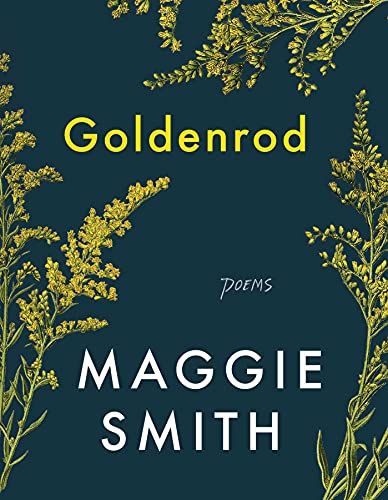I am going to come out and say it: when our license plates were the meadowlark and the goldenrod, I loved them. I thought they were beautiful. Goldenrod may look like the allergy sufferer’s nemesis, ragweed, but is it innocent, blameless, unfairly maligned! A lovely, important part of our ecosystem, and a worthy state flower.
That was not why I chose to read Maggie Smith’s 2021 poetry collection, Goldenrod, but it was a point in her favor. One of my favorite poems is actually Smith’s “Good Bones.” My copy of Goldenrod was gifted to me from a friend and former mentor; it is possible that I have shared “Good Bones” to my social media so often that I have become associated with Maggie Smith (high praise).
Goldenrod is composed of three sections of poetry, the themes of which are: birth, death, nature, motherhood, and life. There’s a sprinkling of an homage to Mary Oliver — just a hint, just a flavor; to me, no one can hold a candle to Mary. But Mary was just one part of the conversation, and there must be other voices now.
A couple of poems that stood out after my reading were: “For My Next Trick” and “Wild.”
“For My Next Trick” centers around a conversation between the narrator — a mother — and her daughter, who asks
“Where was I …
before I was in your body?
–What was I?”
It’s a conversation about where we (might) come from, and what (might) happen after we die, and the connection between death and life, and what (might) go on after us. The (maybe) answer comes in the last stanzas of the poem-conversation:
I tell her the stars
are the exception–
burned out but still lit.
No, not ghosts,not exactly. Nothing
to be scared of.
That final sentence “Nothing to be scared of” is so poignant in its simplicity, the tone perfectly set for talking to a child — and as a result, it is comforting regardless of age.
“Wild” really called to mind the Mary Oliver homage for me; there is so much to loving the world, and struggling to love it, and just existing despite the brutality of man and nature. “Wild” also feels like a worthy companion to “Good Bones.”
I’ve talked so much about loving the world
without any idea how to do it.
…
The world I’m trying to love
is all teeth and need, all gray mange
All poetry is conversation, and I hear these lines as speaking towards “At the River Clarion“, specifically one of my favorite lines, which itself spins back to Tennyson, and nature, red in tooth and claw (In Memoriam A. H. H.):
If God exists he isn’t just butter and good luck.
He’s also the tick that killed my wonderful dog Luke.
Said the river: imagine everything you can imagine, then keep on going.
Overall, a delightful and meditative collection of poetry that can be read in an afternoon — but probably should be read slowly, and savored like a good cup of tea.
Maggie Smith is the author of several other poetry collections, as well as her 2023 memoir, You Could Make this Place Beautiful.
Smith, Maggie. Goldenrod: Poems. One Signal Publishers/Atria, 2021.


